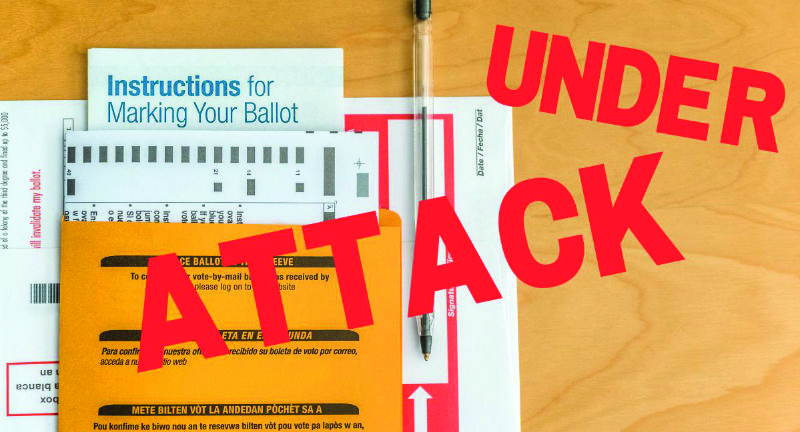Health Equity Ballot Measures are Under Attack
While state ballot measures are increasingly being used to improve health access nationwide, efforts to limit voter access to this process are also on the rise. In 2023 alone, 75 bills were introduced in state legislatures aimed at making the ballot measure process more difficult, with that number climbing to 103 bills in 2024 so far.
In a media briefing on November 22, hosted by Ethnic Media Services, a panel of experts discussed the restrictions that ballots are starting to face.
Speakers
![]()
- Avenel Joseph, Interim Executive Vice President, Robert Wood Johnson Foundation
- Chris Melody Fields Figueredo, Executive Director, Ballot Initiative Strategy Center Foundation
- Richard Von Glahn, Political Director, Missouri Jobs with Justice
“Ballot measures are a form of direct democracy, across party lines. They let voters make meaningful change on issues they care about, even if they’re not being addressed in their state legislatures,” said Avenel Joseph.
The Role of Ballot Measures
A recent Health Affairs study found that 63.5% of the 534 state ballot initiatives passed between 2014 and 2023 were health care-related, focusing primarily on abortion and Medicaid.
In November 2024 alone, voters in seven states approved measures protecting abortion rights in their state constitutions. Nebraska, Alaska, and Missouri passed measures to provide paid sick leave for workers, while Missouri also voted to raise the minimum wage to $15 per hour. Meanwhile, attempts to restrict the ballot measure process were defeated in Arizona and North Dakota.
“It’s no coincidence that efforts to restrict ballot measure access are increasing while advances for a more just America are passing at the ballot box through policies like paid leave, minimum wage and abortion access,” said Joseph. “But elected officials are often more likely to further corporate or partisan interests than are the communities that they represent, who are coming together to collect those signatures … while efforts to restrict ballot measures frequently come from partisan special interest groups.”
For example, despite over 57% of Florida voters supporting a measure to protect abortion access up to 24 weeks of pregnancy, it failed to pass due to a 2004 constitutional amendment requiring a 60% supermajority for approval. “Whenever we get community voices not only heard but enacted on, there’s going to be creative backlash, like raising the threshold,” Joseph explained.
Missouri’s Proposition A
“The ballot measure process has existed in Missouri for over 100 years, and it serves as a crucial check on our legislature, especially in years when the latter isn’t meeting the needs of our people,” said Richard von Glahn.
Proposition A, which guarantees paid sick leave and raises the state’s minimum wage to $15 by 2026, passed with 58% support in November 2024. Before its passage, nearly one-third of Missouri’s workforce—about 730,000 people—lacked access to any paid time off.
“This is part of access to health care, too,” von Glahn noted. “If you have insurance but you can’t afford to take a day away from work, that insurance isn’t worth anything to you because you can’t use it.”
Missouri’s current minimum wage leaves full-time workers earning less than $500 per week before taxes—well below the living wage in any county in the state, according to the MIT Living Wage Calculator.
The campaign for Prop A relied on grassroots support, with nearly 900 volunteers collecting over 210,000 signatures to place the measure on the ballot. In the final stretch, more than 1,500 volunteers knocked on over 150,000 doors to raise awareness.
Von Glahn shared a story from a campaign leader, Fran Marion, a fast-food worker from Kansas City, “…when her daughter was sick and staying home from school. She had to leave that child to go to work and put food in the pantry, and her child asked: ‘Why won’t you stay and take care of me?’ To feel like you can’t be there for a child in need, no one should have to make those choices.”
More than 500 businesses, primarily small enterprises, supported Prop A. “Safe, fairly treated workers are what drive economic growth by spending their income back in local economies,” von Glahn said. “Nor is it a partisan divide — in rural counties, as many as one in four workers voted both for Donald Trump and Proposition A.”
Challenges to Ballot Measure Access
“Just because we won something on Election Day, doesn’t mean the work is over, especially in these coming months,” said Chris Melody Fields Figueredo who tracks ballot measures and legislative trends through the BISC Ballot Hub.
Opposition often takes the form of higher vote thresholds for passage, more complex language requirements for measures, or geographic distribution rules for signature collection. These tactics disproportionately burden grassroots organizations in rural areas.
In Ohio, for example, Issue 1—a measure to create a citizen commission for fairer redistricting—failed with 46% support against a 50% threshold, largely due to confusing ballot language. In Florida, police were sent to the homes of voters who signed a validated petition supporting Amendment 4, which aimed to overturn the state’s six-week abortion ban. Despite gaining majority support, the measure fell short of the 60% requirement.
“In any other state, 57% would be a significant majority,” Figueredo said, pointing out that Amendment 4 secured one million more votes than Governor Ron DeSantis. “We expect to see pushback like this in other states as well, where many down-ballot measures over-perform elected state officials.”
Ballot Measures as a Bridge to Trust
“People trust themselves and their communities first,” Figueredo added, “and ballot measures can be a bridge to restore that trust to our democratic institutions by letting people directly improve the material conditions of their health.”
While efforts to restrict ballot measures continue, advocates stress their importance in addressing the everyday struggles of Americans. From paid leave to fair wages, these initiatives give voters a direct say in shaping policies that impact their lives.
Images provided by Ethnic Media Services.


